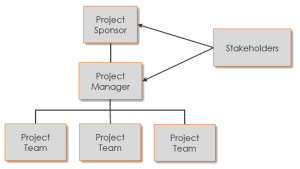
Project Management is defined by the Project Management Body of Knowledge (PMBOK), developed and maintained by the Project Management Institute (PMI) as:
- The application of knowledge, skills, tools, and techniques to project activities to meet project requirements.
Project management, then, is the engine that drives a project from vision to reality, ensuring goals are met, stakeholders are satisfied, and obstacles are navigated with precision.
At its heart, the profession of project management demands a versatile skill set that transforms abstract ideas into tangible outcomes. This includes breaking a project into manageable tasks, crafting schedules with clear deadlines, estimating budgets that balance ambition with practicality, and defining a project’s scope to keep it on track.
But it doesn’t stop there. Effective project management also hinges on communicating seamlessly with stakeholders, assembling and inspiring a capable project team, securing essential resources, and upholding the quality of every deliverable. From mentoring team members to monitoring progress and controlling change, project managers wear many hats, adapting to each challenge with foresight and finesse.
Whether you’re steering a small initiative or a sprawling enterprise, project management is the backbone of success. Curious about stepping into this dynamic role? Explore further in our guide: How to Become a Project Manager.
The many skills required by the project manager include:
- Dividing the project into tasks
- Creating schedules (deadlines)
- Estimating budgets
- Determining project scope
- Communicating with stakeholders
- Acquiring the project team
- Developing and mentoring the project team
- Ensuring the availability of resources
- Ensuring high quality deliverables
- Monitoring and controlling change
Read More: How to Become a Project Manager
What is a Project?
A project is a temporary endeavor undertaken to create a unique product, service, or result.
The two most important concepts are:
- Temporary: Projects have a defined beginning and end. Because of this, they have a fixed:
- Budget
- Schedule (deadlines)
- Unique: Theoretically, all projects are different from one another. Even if you were to have two projects, one which produces 25 widgets for a certain customer and another that produces 25 more widgets for that same customer, even those are two separate projects because they have different schedules. You cannot call them one single project because you could miss the deadline on the first set of widgets.
What is a Project Manager?
A project manager is the person assigned by the performing organization to lead the team that is responsible for achieving the project objectives.
 They are responsible for the day to day activities of the project. They are separate from a functional manager who is responsible for a business unit, or an operations manager who is responsible for maintaining the functionality of an asset.
They are responsible for the day to day activities of the project. They are separate from a functional manager who is responsible for a business unit, or an operations manager who is responsible for maintaining the functionality of an asset.
For example,
- A project manager is in charge of a paving project (a temporary, unique endeavor)
- An operations manager is responsible for maintaining the road network
- An engineering manager is a functional manager who is in charge of that department.
The project manager could report to either of these types of managers, but their responsibilities end at the project.
The project manager is ultimately responsible for the success or failure of the project, although they often share some of that responsibility with the project sponsor.
The person one level above the project manager is called a project sponsor. They are not involved with the day to day activities of the project, but they are usually familiar with the project status. They often approve changes to the project, as well as manage the project’s funding. They accept the project’s deliverables. Often they were the project’s champion that promoted the creation of the project. In the example above, the project sponsor would be someone working for the agency (state, province, etc.) who established the paving project as a priority for the agency and brought it to fruition.
The 5 Project Phases
The following five phases form the project life cycle.
- Project Initiation. The tasks involved with the creation of the project, including initial funding and authorization of the project manager.
- Project Planning. The production and approval of the project management plan.
- Project Execution. The performance of the project’s work, and production of the deliverables.
- Monitoring & Controlling. Controlling the project to ensure it continues to adhere to the project management plan.
- Project Closing. Finalizing the project and releasing project resources.
The Project Management Body of Knowledge (PMBOK) uses the technical term process groups to describe these phases. They are generally in chronological order but the project can sometimes revert back to a previous phase. For example, when the paving project is finished the construction of concrete curbs, some tasks might have to be performed before the paving begins that are considered planning.
The Project Management Plan
In all three major project management methodologies, the project manager develops a project management plan which is approved by the project sponsor. During the project, any changes are re-approved by the project sponsor and recorded in the project’s change log.
The project management plan contains the following items:
- Scope statement
- Deliverables
- Success factors
- Schedule
- Budget
- Quality standards
- Project team needs – positions, job descriptions, etc.
- Stakeholder list
- Procurement plan
- Risk analysis











Leave a Reply